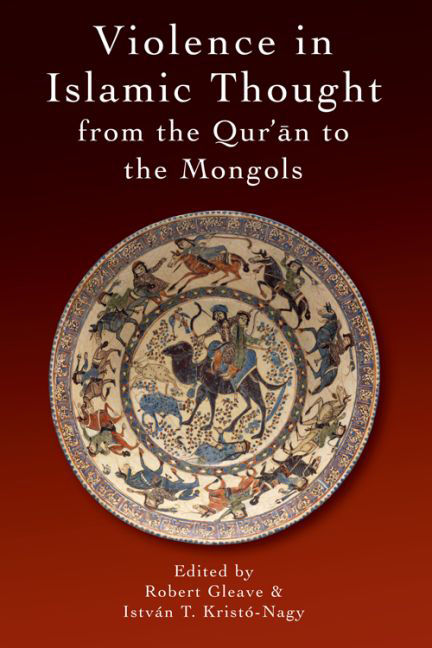Book contents
- Frontmatter
- Contents
- Dates and Abbreviations
- List of Figures and Tables
- 1 INTRODUCTION
- PART I JIHĀD AND CONQUEST: ATTITUDES TO VIOLENCE AGAINST THE EXTERNAL ENEMIES OF THE MUSLIM COMMUNITY
- 2 THE QUESTION OF DIVINE HELP IN THE JIHĀD
- 3 READING THE QURĀN ON JIHĀD: TWO EARLY EXEGETICAL TEXTS
- 4 IBN AL-MUBĀRAK'S KITĀB AL-JIHĀD AND EARLY RENUNCIANT LITERATURE
- 5 SHAPING MEMORY OF THE CONQUESTS: THE CASE OF TUSTAR
- PART II THE CHALLENGED ESTABLISHMENT: ATTITUDES TO VIOLENCE AGAINST THE STATE AND IN ITS DEFENCE WITHIN THE MUSLIM COMMUNITY
- PART III LUST AND FLESH: ATTITUDES TO VIOLENCE AGAINST THE DEFENCELESS, INTRA-COMMUNITARIAN VIOLENCE BY NON-STATE ACTORS
- Bibliography
- Index of Qurānic Citations
- General Index
2 - THE QUESTION OF DIVINE HELP IN THE JIHĀD
from PART I - JIHĀD AND CONQUEST: ATTITUDES TO VIOLENCE AGAINST THE EXTERNAL ENEMIES OF THE MUSLIM COMMUNITY
Published online by Cambridge University Press: 15 September 2017
- Frontmatter
- Contents
- Dates and Abbreviations
- List of Figures and Tables
- 1 INTRODUCTION
- PART I JIHĀD AND CONQUEST: ATTITUDES TO VIOLENCE AGAINST THE EXTERNAL ENEMIES OF THE MUSLIM COMMUNITY
- 2 THE QUESTION OF DIVINE HELP IN THE JIHĀD
- 3 READING THE QURĀN ON JIHĀD: TWO EARLY EXEGETICAL TEXTS
- 4 IBN AL-MUBĀRAK'S KITĀB AL-JIHĀD AND EARLY RENUNCIANT LITERATURE
- 5 SHAPING MEMORY OF THE CONQUESTS: THE CASE OF TUSTAR
- PART II THE CHALLENGED ESTABLISHMENT: ATTITUDES TO VIOLENCE AGAINST THE STATE AND IN ITS DEFENCE WITHIN THE MUSLIM COMMUNITY
- PART III LUST AND FLESH: ATTITUDES TO VIOLENCE AGAINST THE DEFENCELESS, INTRA-COMMUNITARIAN VIOLENCE BY NON-STATE ACTORS
- Bibliography
- Index of Qurānic Citations
- General Index
Summary
The theme of ‘help’ is ubiquitous in the Qurān. In it, composites of the root n-ṣ-r appear approximately 120 times with that meaning. But more explicitly, in the sūras that are traditionally associated with the Medinan period (particularly, sūras 5, 8 and 9), this theme comes to light as the idea of a concrete aid given by God to those who fight for Him: this idea appears twelve times, and in two of these, there is a passage of several verses where the verb naṣara or the substantive naṣr is explicitly stated ten times.
This help from God can take on several aspects. The Qurān sometimes insists on the contrast between the divine plan and the limited vision of humans: it is then a question of divine inspiration as to the decision to fight, in spite of the reluctance of some people (Q 3:5; 33:11–15), or not to give in to the temptation to flee (Q 9:25). Sometimes it might be a designation of a more significant goal than that envisioned by human calculations (Q 8:7). Sometimes, it is purely and simply the affirmation of the fact that it is only in God that efficiency resides: God ‘turns away the hands’ of adversaries (Q 5:11), it is He Himself, and not the believers, who kills the infidels (Q 8:17); He sends ‘invisible’ cohorts (Q 33:9; 9:26) – i.e. angels – the thousands of which can multiply (Q 8:9; 3:124–5).
This twofold perspective finds extended discussion in the description of the aim of this help. The Qurān insists on the concrete aspect – that is, ‘the torment of infidels’ (Q 9:26), the effective victory (Q 3:127) that can be granted only by that divine help (Q 3:160); the announcement of that happy event is a piece of good news which ‘tranquillises the hearts (of believers)’ (Q 8:10; 3:126) and ‘heals’ them (Q 9:14). It ‘makes believers feel God's favour’ (Q 8:17) or, even more, it ‘makes the sakīna [that is, the divine presence] descend into the hearts of believers’ (Q 48:4); and this sakīna is explicitly linked with military success (fa-anzala al-sakīna alayhim wa-athābahum fatḥan qarīban, Q 48:18; cf. also 9:26).
- Type
- Chapter
- Information
- Publisher: Edinburgh University PressPrint publication year: 2015

